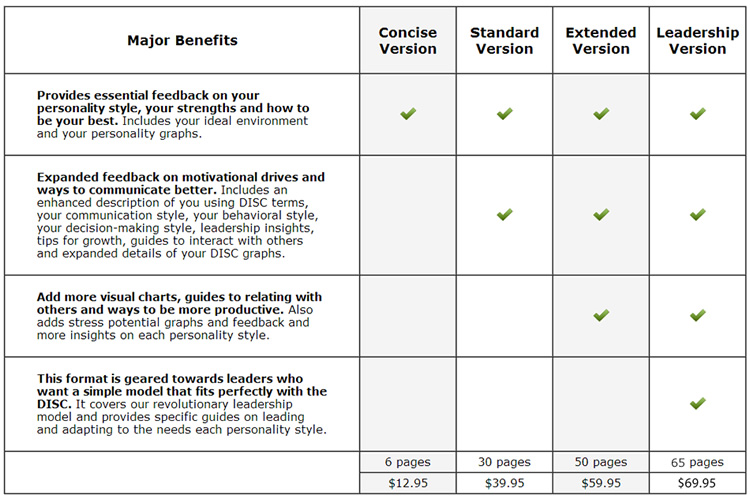Which Assessment is Right for Me?
Here is a description of the four most common DISC adult assessments and what you get in each:

Summary of Adult Versions:
Concise 6-page adult version: Provides essential feedback on your personality style, your strengths and how to be your best. Includes your personality graphs.
Standard 30-page adult version: Adds expanded feedback on motivational drives and ways to communicate better. Includes enhanced descriptions, your communication style, your behavioral style, your decision-making style, leadership insights, tips for growth, guides to interact with others and expanded details of your DISC personality graphs.
Extended 50-page adult version: Adds more visual charts and guides to relating to others in more productive ways. Adds stress potential graphs and more insights on the major personality styles.
Direct Sales 50-page adult version: Very similar to the extended version, but tailored for sales by covering the topic of contacting others.
Leadership 65-page adult version: The feedback in this report is geared towards leaders who want a simple model that fits perfectly with DISC. It includes a description of the leadership model as well as leadership guides to work with each of the 4 main personality styles.
Summary of Child and Teen Versions:
Teen concise version (12-pages): A great value for teens. Includes an introduction to the DISC model, words that describe, strengths, keys to growth, characteristics as a team member, career suggestions and decision-making style.
Teen extended version (57-pages): This version gives extensive feedback for the teen and also includes some helpful feedback for parents and teachers. Areas covered in addition to the concise version are tendencies and motivation style, communication style, the best way to work with you, tips for working with others, career lists and tips and clues in recognizing the personality styles of others.
Child concise version (8-pages): Great resource for parents and teachers who want to gain insights into the personality type of a child. The recommended age range is 5-12. An adult can assist younger children with the assessment if needed to read the story and help with following the instructions. The report includes words that describe the child, strengths, tips to help the child mature, environmental needs, motivation preferences, and more!
What is DISC?
We use the proven DISC Personality model as a tool to jump start understanding and have meaningful conversation.
What is DISC?
What is a DISC Assessment?
A DISC assessment is a quick and simple way for you to determine your personality style. You answer a questionnaire where there are no right or wrong answers – just your choices based on how you see yourself. A DISC Assessment is also commonly called a DISC test or a personality test. We do not prefer to call it a personality test, because it is not a pass or fail situation. Again, there are no right or wrong answers – just choices that you make.
What is a DISC Profile?
A DISC profile is a personalized report that is created by our system based on the answers you provided in your DISC assessment. It provides insights about your personal strengths, your preferences in communication and your behavioral traits. DISC profile reports are available that range from concise formats (6-pages) to extended formats of 30-50 pages or more of feedback. Our profiles are carefully designed to be positive and encouraging to help you be your best!
What makes a Personality Profile unique from other DISC-based personality profiles?
Personality Profile are distinguished from other DISC personality profiles available on the market by offering the following important features:
- You will receive positive, personalized feedback. We want you to be encouraged after you read your report, so the language we use is uplifting and helpful.
- You will be encouraged in your strengths. You will better understand the value you have on a team and as an individual.
- Your report will not label you in a simplistic manner. Many reports on the market give feedback based on only the 4 major personality traits. Your profile goes much further by emphasizing your unique BLEND of traits. Our technology is based on 41 specific blends of personality traits. Therefore, you get in-depth feedback while still having the advantage of the easily understood DISC model.
- You will not be labeled as having particular weaknesses or “blind-spots.” No assumptions will be made about areas that you need to grow in. Instead, we identify areas to consider in order to be your best without being critical. This is, perhaps, the most unique aspect of our approach.
- We offer high value in the quality of the feedback given. We know that there is a wide range of prices available for personality reports in the market. Our approach is to offer reports that are both positive and practical, so we have invested heavily into our report processor system. Our content database is very extensive and has required many years to develop. Thus, our focus has not been to have the lowest price products. Our focus has been to offer the best personality reports with the highest value.
How does DISC compare to Myers Brigg, Enneagram, and other types of indicators?
We have chosen to use DISC because we have found that it is more easily applied and remembered in the team and workforce environment. MBTI (Myers Brigg Type Indicator) and the Enneagram are more introspective and helpful when learning about yourself. At Team Verve our main focus is on team growth and workforce development. We have chosen to use the DISC model because we have found that is a good framework for understanding and working with a team of people. We place emphasis on individuals learning about and understanding the team members that are very different than themselves.